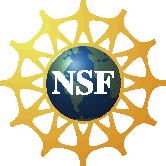
 |
Sponsors

The Office of Research and Sponsored Programs: UM-Dearborn

Rackham School of Graduate Studies, UM-Ann Arbor

National Science Foundation

The Petroleum Research Fund of the American Chemical Society
There has been a remarkable growth in the synthesis of metal nanoparticles immobilized on solid support due to their unusual catalytic properties. Although different synthesis strategies, like direct deposition-precipitation or surface-capping methods are explored for achieving a specific size range for these nanostructures; factors controlling size, shape, and interparticle spacing as well as their structure-activity relationship are still poorly understood. Our research uses organized assemblies to generate metal nanoparticles engineered for electro-catalytic applications. X-ray photoelectron spectroscopy (XPS) and Atomic force microscopy (AFM) are used to monitor the chemical and structural development of these nanostructures. This research provides a simple route to prepare a stable and catalytically active surface immobilized metal nanoparticle array with controllable morphology and high monodispersity. The results help us in understanding the structure and catalytic activity relationship.
Improved detection method show great promise in enabling a rapid, sensitive, and accurate identification of clinical pathogens and biothreat agents. Various techniques involving radiochemical, enzymatic, fluorescent, colorimetric, and chemiluminescent methods have been developed for bio-sensing. Our research explores the carbon nanotube arrays on metal and semiconductor electrode combined with AC-based electrochemical technique to detect different biomolecules which can be integrated to microfabrication process for possible device fabrication.
As Nanotechnology and Nanobiotechnology emerge as two most promising fields of science in the twenty first century, more and more concerns are voiced regarding the safety issues of the innumerable nanomaterials being generated and studied. Although it is possible that engineered nanomaterials can have toxic effects, currently there is no substantial evidence that indicate that these effects can pose problem towards human health or they cannot be addressed by reasonable scientific approach. At the same time, we cannot delay the safety evaluation of these nanomaterials any more. Thus, Nanotoxicology emerges as a new area of research that demands understanding of the novel properties of nanomaterials which leads to adverse effect on biological systems. In addition to safe manufacture and implementation of engineered nanomaterials, an understanding of nanotoxicity can have far reaching positive impacts on human health, for example the use of certain nanomaterials to initiate programmed cell death could be used in cancer therapy. The main objective of this research project is to explore the toxic potential of very small metal and semiconductor nanoparticles on yeast (S. cerevisiae) cells. We will also look at the ability of these nanoparticles to generate reactive oxygen species (ROS) and induce oxidative stress.
Debalina Bandyopadhyay, Ph.D. Interests and Expertise: Inorganic Chemistry, Biochemistry
and |
 |
Sonia M. Tiquia, Ph.D.
Associate Professor of Microbiology
Department of Natural Sciences
University of Michigan-Dearborn
http://www.casl.umd.umich.edu/tiquia
John C. Thomas , Ph.D.
Professor of Biology and Chair, Biological Sciences Discipline
Department of Natural Sciences
University of Michigan-Dearborn
http://www.casl.umd.umich.edu/thomas
Vaman M. Naik , Ph.D.
Chair, Department of Natural Sciences and Professor of Physics
Department of Natural Sciences
University of Michigan-Dearborn
http://www.casl.umd.umich.edu/159601
Gavin Lawes, Ph.D.
Assistant Professor of Physics and Astronomy
Department of Physics and Astronomy
Wayne State University
http://www.physics.wayne.edu/~glawes/
Ratna Naik, Ph.D.
Chair and Professor, Department of
Physics and Astronomy
Department of Physics and Astronomy
Wayne State University
http://www.clas.wayne.edu/unit-faculty-detail.asp?FacultyID=357